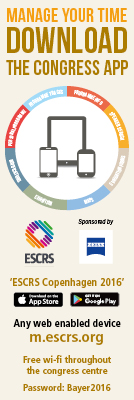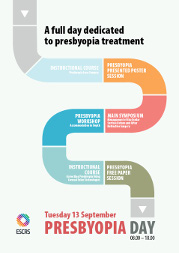Posters
Current opinions on corrective refractive surgery
Poster Details
First Author: H. Chung CANADA
Co Author(s): J. Bhamra E. Sanders
Abstract Details
Purpose:
Refractive error is the most common ocular abnormality and, when left untreated, the second leading cause of vision loss worldwide. Different treatment options are available, from glasses and contact lenses to laser refractive surgery and lenticular refractive surgery, such as cataract refractive surgery, refractive lens exchange, and phakic IOL implantation. Our purpose was to examine opinions among ophthalmologists for lenticular refractive surgery as well as investigate their regards toward femtosecond laser-assisted cataract surgery (FLACS).
Setting:
Online survey conducted through the University of Calgary and Alberta Health Services, Canada.
Methods:
An online survey was created and reviewed by a group of ophthalmologists in Calgary, Canada as well as the American Society for Cataract and Refractive Surgery (ASCRS) Refractive Clinical Committee. The survey was distributed to the ASCRS email list, consisting of an estimated 7800 individuals, and was open for a month-long period during the summer of 2014.
Results:
396 surveys were received. When asked if they would personally undergo lenticular surgery, 45.3% replied yes, with 12.3% having already undergone the procedure. Among those who said yes, most preferred a monofocal intraocular lens (IOL) implant (34.1%), whereas those who said no felt Toric IOLs superior (38.4%). Only 46.6% would undergo FLACS; the greatest reported reason against FLACS was concern regarding efficacy of the procedure (71.1%), followed by concerns with safety (50.2%). Pearson chi-square analysis found that gender, age, stage of practice, and location of training and practice were not significantly associated with willingness to undergo lenticular surgery or FLACS.
Conclusions:
Our survey had a 5.7% response rate, with the majority of respondents being males aged 51-55. To the best of our knowledge, this study is the first to examine ophthalmologists’ opinions on corrective refractive surgical options beyond laser surgery, as well as on the use of femtosecond laser technology in cataract surgery. Interestingly, less than half of ophthalmologists surveyed would personally undergo lenticular surgery, which includes cataract refractive surgery and FLACS.
Financial Disclosure:
NONE





